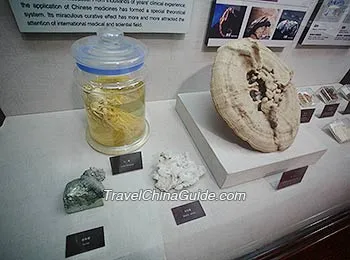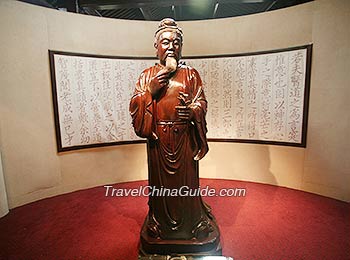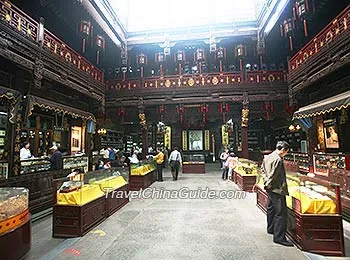Museum of Traditional Chinese Medicine
The Museum of Traditional Chinese Medicine is the only state-level professional Chinese medicine museum in the country. It is seated at the foot of Wu Hill in Hangzhou, Zhejiang Province. The museum is housed in the restored ancient structure-Hu Qing Yu Tang, meaning that it is also known as Hu Qing Yu Tang Museum of Traditional Chinese Medicine.
Hu Qing Yu Tang was a Chinese pharmacy which began business in 1874. It had won a great fame during its development. People regarded it as the 'King of Medicine' in southern China. Hu Xueyan, the first boss of the pharmacy, was not only a successful businessman but also a high-class official in the imperial court. In China's feudal society, people doing business were widely looked down upon whereas state officials were highly respected. Many tourists are attracted to the Hu Qing Yu Tang Museum to not only appreciate the treasures of Chinese medicine, but also to admire its magnificent architectural complexities and to learn more about Hu's legendary stories.
The Museum of Traditional Chinese Medicine consists of five parts: the Exhibition Hall, the Medicine Preparation Hall, the Chinese Health Care Clinic, the Restaurant of Medicinal Diet and the Sales Department. The Exhibition Hall introduces the development of Chinese medicine, including its origin, the life of well-known doctors in its long history, famous books of medical science and China's herb exchange with foreign countries, etc. In the Medicine Preparation Hall, the museum's staff also performs the arts of traditional pharmaceutics. If you are interested, you can even try it yourself. In the Chinese Health Care Clinic, visitors have the opportunity to receive Chinese-style health care served by experienced doctors. The Restaurant of Medicinal Diet provides visitors with numerous medicinal diets which are good for human health. The Sales Department sells Chinese medicine from almost all parts of the country.
 | | Traditional chinese medicine materials | |  | | Sun Simiao, the king of Chinese medicine | |
How to get to Museum of Traditional Chinese Medicine
Take Bus 8, 60, 127, 195, 208, or 216 to Qinghefang Station. And then walk southeast for 2 minutes to the Museum of Traditional Chinese Medicine.
Hangzhou Bus / Metro Search | Entrance Fee | CNY 10 |
| Opening Hours | 8:30 - 16:00 |
- Last updated on Aug. 18, 2025 by Demi Li -


